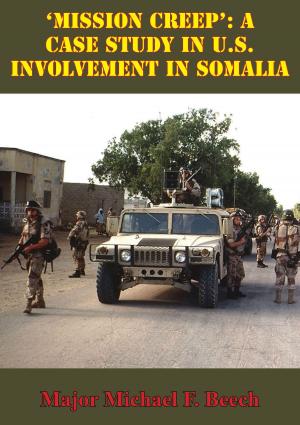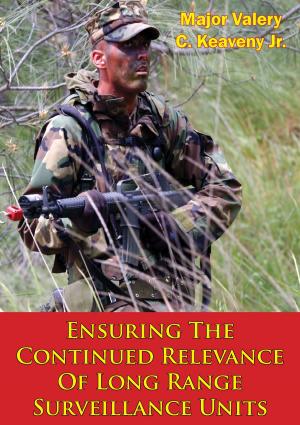“Cry Havoc And Let Slip The Dogs Of War”. Special Operations And The Military Working Dog
Nonfiction, History, Middle East, Persian Gulf War, Military| Author: | Major Joseph F. Whelan | ISBN: | 9781782896098 |
| Publisher: | Tannenberg Publishing | Publication: | August 15, 2014 |
| Imprint: | Tannenberg Publishing | Language: | English |
| Author: | Major Joseph F. Whelan |
| ISBN: | 9781782896098 |
| Publisher: | Tannenberg Publishing |
| Publication: | August 15, 2014 |
| Imprint: | Tannenberg Publishing |
| Language: | English |
This paper examines the potential for military working dogs to support Special Operations Forces (SOF). Modern technology has not eliminated the operational prospective for the military employment of dogs. Canine olfactory superiority, advanced hearing, and ability to detect movement offer significant military employment potential. Military working dogs can be trained for scouting, patrolling, building and ship searches, countermine, counterdrug and tracking. When used properly, dogs are an inexpensive and efficient force multiplier.
Qualitative research using correlational data comprises the monograph's methodology. Military working dog capabilities, limitations, and historical employment will be discussed and then compared to Special Operation Forces principal missions and collateral activities.
The conclusion demonstrates that dogs have a wider role to perform in today's operational environment and that military working dogs can augment and complement SOF operations. Nearly every SOF mission can benefit from the inclusion of dogs- particularly in support of Stability and Support Operations conducted in developing countries that cannot employ or sustain complex and technologically sophisticated equipment. Military working dogs are a proven, low technology, combat and combat support capability and may have a future role in support of Special Operations Forces.
This paper examines the potential for military working dogs to support Special Operations Forces (SOF). Modern technology has not eliminated the operational prospective for the military employment of dogs. Canine olfactory superiority, advanced hearing, and ability to detect movement offer significant military employment potential. Military working dogs can be trained for scouting, patrolling, building and ship searches, countermine, counterdrug and tracking. When used properly, dogs are an inexpensive and efficient force multiplier.
Qualitative research using correlational data comprises the monograph's methodology. Military working dog capabilities, limitations, and historical employment will be discussed and then compared to Special Operation Forces principal missions and collateral activities.
The conclusion demonstrates that dogs have a wider role to perform in today's operational environment and that military working dogs can augment and complement SOF operations. Nearly every SOF mission can benefit from the inclusion of dogs- particularly in support of Stability and Support Operations conducted in developing countries that cannot employ or sustain complex and technologically sophisticated equipment. Military working dogs are a proven, low technology, combat and combat support capability and may have a future role in support of Special Operations Forces.








![Cover of the book Hitting Home - The Air Offensive Against Japan [Illustrated Edition] by Major Joseph F. Whelan](https://www.kuoky.com/images/2015/november/300x300/9781786252432-Mh6l_300x.jpg)
![Cover of the book Block By Block: The Challenges Of Urban Operations [Illustrated Edition] by Major Joseph F. Whelan](https://www.kuoky.com/images/2014/august/300x300/9781782897781-zM5J_300x.jpg)





